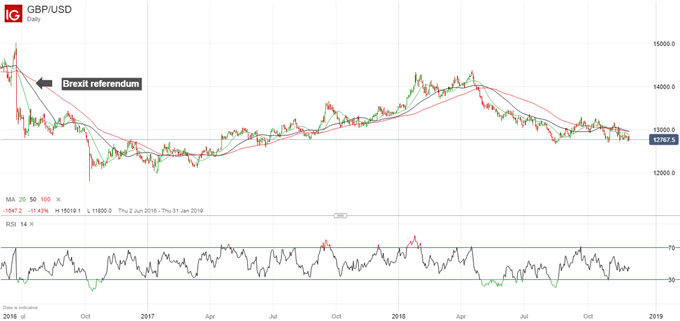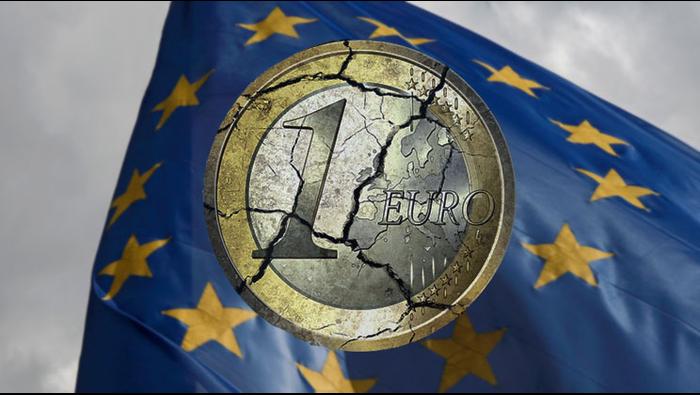This article was first published on November 30
Brexit and GBP price analysis:
- The UK Parliament will soon start debating Prime Minister Theresa May’s Brexit deal with the EU and is expected to vote on it on December 11.
- Political analysts predict that the agreement will be rejected.
- If so, there are several possible outcomes, including a ‘no-deal’ Brexit, the replacement of May as Prime Minister, a second referendum or a general election.
- Here is how the British Pound might react to these various alternatives.
Brexit Impact on GBP
The Westminster Parliament will soon start debating the Brexit agreement reached by UK Prime Minister Theresa May and the EU – and the result of that vote, and what comes next, will be crucial for the GBP price. While it is impossible to predict precise levels, some outcomes will be less negative than others so here are some of the possibilities and how the British Pound might be expected to react.
Brexit Timetable
According to the Bloomberg news agency, there will be five days of eight-hour debates starting on December 4, with a break from December 7-9. Voting will start at 1900 local time on December 11 on a series of amendments to the government’s motion, likely to include calls for another referendum, for the government to seek a customs union with the EU or a block on leaving without a deal – an amendment already tabled by the main opposition Labour Party. Finally, the House of Commons will vote on the government’s motion, including any amendments that passed.
A New Prime Minister
If the deal is rejected – and the chances of it being agreed are remote – one possible outcome would be a new Prime Minister if May resigns, is ousted by her ruling Conservative Party or loses a no-confidence vote in Parliament. While the Pound would likely fall on “political uncertainty” if the agreement were rejected and fall further if May resigned or was forced out, the Brexit impact on GBP might well be limited on the argument that a new leader might have a better chance of bringing together the UK’s squabbling lawmakers. A level around 1.25 for GBPUSD seems realistic.
GBPUSD Price Chart, Daily Timeframe (June 5, 2016 – November 29, 2018)

Click on the chart for a larger image
If against all the odds the deal is approved a level closer to 1.35 is plausible even though the agreement is seen widely as far from ideal. If May hangs on to power despite losing, a deeper dive to, say, 1.20 seems reasonable as she would be seen as a lame duck.
A Second Brexit Referendum
Calls for a second referendum or “people’s vote” have been growing louder, especially by those who are against Brexit and think the public would reverse their decision first-time round. If that were agreed – and politicians are mostly against it – and Brexit was indeed overturned, GBPUSD could be expected to soar back to where it was before the initial vote at around 1.45. This would be the most positive Brexit effect on GBP.
Note, though, that a victory for the so-called Remainers could soon be followed by a call for a “best of three” and that would inevitably send GBPUSD lower again.
No-Deal Brexit
For the UK to leave the EU next March without a deal is the worst-possible outcome for GBP. When the Bank of England modelled various post-Brexit scenarios it concluded that GBP could fall by a quarter on a “disorderly Brexit” – taking GBPUSD down to around parity, 1.00. The Bank’s modelling was arguably flawed; for example, the worst-case scenario assumed Bank Rate would jump to 4.0% even though it is hard to see the central bank increasing rates against a backdrop of recession, sharply higher unemployment and much lower house prices.
Nonetheless, the possibility of GBPUSD tumbling to 1.10 is not unreasonable, with a no-deal Brexit having the largest Brexit impact on GBP.
A General Election
This is, naturally, the preferred option of the main opposition Labour Party. At the time of writing, Labour leader Jeremy Corbyn is the betting companies’ favorite to be the next Prime Minister but the financial markets, generally speaking, prefer the Conservatives to Labour.
This time it might be different. While not committed to the UK remaining in the Customs Union and the EU Single Market, Labour has come close in its Negotiating Brexit manifesto. This states that “We will scrap the Conservatives’ Brexit White Paper and replace it with fresh negotiating priorities that have a strong emphasis on retaining the benefits of the Single Market and the Customs Union – which are essential for maintaining industries, jobs and businesses in Britain.”
In its Where We Stand document it says only that it would seek to remain in the Customs Union and the Single Market during a transition period but the Scottish National Party, the third largest grouping in Parliament, is fully committed to this so-called Norway option. Either an outright Labour victory or a Labour/SNP coalition might therefore be welcomed by the markets.
The Brexit impact on GBP might well therefore be positive, with GBPUSD at least holding its ground and perhaps even advancing modestly to, say 1.30.
Victory For the Brexit Hardliners
A free-trade agreement, like those negotiated by the EU with Canada and South Korea, is the favored option of Brexit hardliners such as former UK Foreign Secretary Boris Johnson and Jacob Rees-Mogg, who chairs the European Research Group of Conservative Members of Parliament opposed to EU membership.
It is hard to see how this group could ever command a majority in Parliament. However, if one were to be chosen by the Conservatives to replace Theresa May, the so-called Canada+ option would come into focus. GBP would likely fall hard, given that the period of Brexit uncertainty would continue with no likely end in sight, and GBPUSD could drop to 1.25 or lower. If a less hardline Conservative such as Home Secretary Sajid Javid were to replace May, the drop would likely be more limited.
More to read:
Brexit Timeline: The Path Ahead
Brexit Effect on Pound and UK Stocks: Impact of Deal or No Deal
Using News and Events to Trade Forex
Resources to help you trade the forex markets:
Whether you are a new or an experienced trader, at DailyFX we have many resources to help you:
- Analytical and educational webinars hosted several times per day,
- Trading guides to help you improve your trading performance,
- A guide specifically for those who are new to forex,
- And you can learn how to trade like an expert by reading our guide to the Traits of Successful Traders.
--- Written by Martin Essex, Analyst and Editor
Feel free to contact me via the comments section below, via email at martin.essex@ig.com or on Twitter @MartinSEssex





